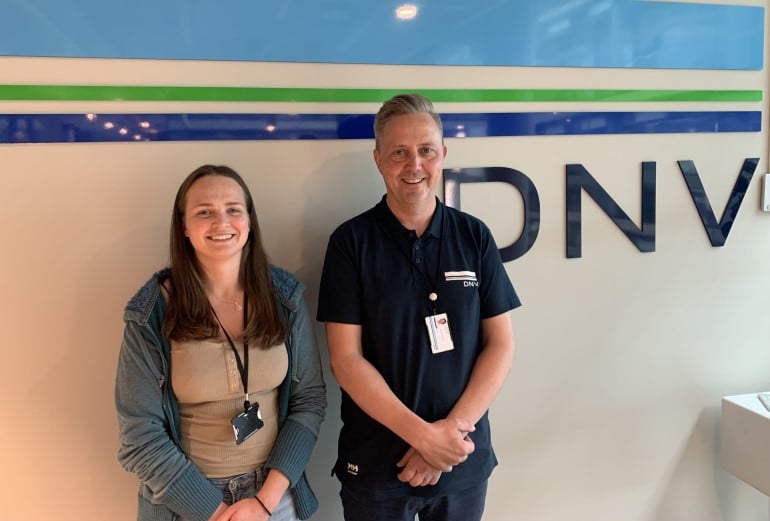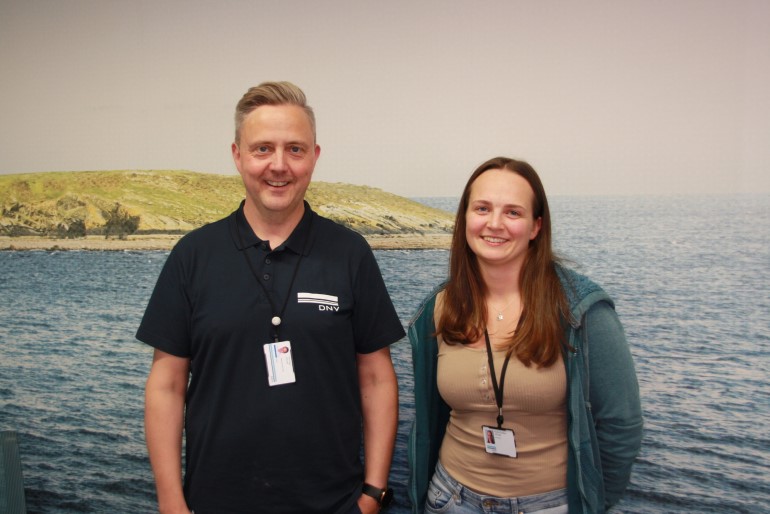When Pauline Sundvor Opstad graduated as an engineer from the Norwegian University of Science and Technology (NTNU) last year, she was sure she wanted a job where she could combine the theory she had learned with practical work in the field.

Pauline Sundvor Opstad joined DNV in a graduate position as a surveyor after the summer. She shares her best jobseeker tips with other new graduates. Photo: DNV
“When I saw DNV’s adverts for the positions in the Graduate Programme, I thought a surveyor seemed to be a very exciting job involving many new challenges. I was also familiar with DNV, which had been on our campus a lot and made a good impression."
Pauline decided therefore to apply for the graduate position as a surveyor at DNV’s office in Trondheim. The job involves conducting inspections on ships, among other things.
“First of all, I sent in an application for the job and came further in the application process. The next step was to submit a video I made myself, and do some cognitive tests,” she says.
“Further on in the hiring process, I was invited to attend a digital meeting lasting for two hours, which seemed a lot. However, an important part of the interview involved telling me what I could expect if I worked for DNV, so the time passed very quickly and the interview was not nearly as daunting as it may sound.”
Read more about DNV Graduates 2023
Pauline’s best jobseeker tips
After impressing the interviewers during DNV’s extensive interview process, Pauline was lucky and got the job that she started in after the summer. Here, she shares her experiences and tips for graduates applying for their first job.
1. Reply well to the qualification requirements in the job advert
“It’s important to have the formal requirements in order, so read the job advert carefully and reply to it as well as you can. Don’t forget to include the normal things, such as your CV, grades and suchlike. Remember at the same time that you don’t necessarily have to have all the desired qualifications stated in the job advert in order to be eligible for the job. You’re not fully qualified when you graduate, that’s when your training starts,” she points out.
2. Make yourself stand out from the other applicants
“I met most of the basic requirements, so once you have the technical foundation in place it’s important to stand out from the other applicants. Say what you have done before, it doesn’t have to be relevant to the job you are applying for. I had been involved in elite sports and a member of the rugby national team, and I think this helped to give the impression that I can balance a hectic everyday life involving work and exercise. I also had experience of ships from my initial military service, and that’s quite relevant to my job as a surveyor.”
3. Show your motivation for, and expectations regarding, the job
“State why you’re applying for this particular job, and be as honest as possible. I think you should dare to be yourself, relax, and don’t make things difficult for yourself by being stiff and tense. Try to strike a good tone from the start, and if things go a little wrong at first, remember that you have a good chance of correcting this later. Those on the other side of the table are usually very understanding and used to stressed and nervous jobseekers.”
The recruiter’s best career tips

Pauline’s boss, Kent-Åge Solem, was involved in her recruitment process. Here, he shares his best tips for graduate jobseekers. Photo: DNV
Pauline’s boss, Kent-Åge Solem, is the head of the surveyors in DNV Norway, and was involved in Pauline’s recruitment process. He says they do not just look at grades.
“Before an interview, we read and look at all the CVs. We look at the applicant’s education, grades and subjects taken, language skills and a bit about what he or she has done in addition to studying - during the summer holidays, and so on. We don’t just look at grades,” he emphasizes.
Here are the recruiter’s best tips for newly qualified jobseekers:
1. All experience is good experience
“In this case, we are talking about graduate positions, where the applicant may have a little experience but the jobs are for all practical purposes for new graduates. It is difficult to gain relevant experience of the maritime sector so early in one’s career, so it’s important to state any experience from summer jobs, for example. In Pauline’s case, she had experience of ships in her initial military service, and that was positive. All experience is good experience!”
2. A brief and concise application
“Most of the CVs we receive are good, so it’s important that you write a brief and concise application. Remember also to change and adapt the application to suit the job you are actually applying for. We sometimes see that the applicant has forgotten to change the name of the company or job they are applying for in the application. We don’t look on that as a huge mistake, but this is a good tip nonetheless.”
Reasons for working in DNV
Competitive terms: We offer a comprehensive benefits package, including six weeks’ holiday, a subsidized canteen, healthcare, and competitive pension, insurance and parental leave benefits, in addition to a global profit-sharing scheme.
Work/ life balance: We offer flexible working hours and focus on our employees having a good work/life balance.
Supportive and caring culture: Our international culture is characterized by colleagues who value teamwork and inclusion across business areas and boundaries. You can also join employee associations to establish networks through social and professional activities. Our largest association, CONNECT, arranges After Work and informal meetings all year round.
Career and development: There are good opportunities to grow and develop your expertise and ambitions in DNV. We have a strong corporate culture with a focus on growth, competence sharing and professional and personal development.
A job with DNV makes you part of a world-leading company whose purpose is to safeguard life, property and the environment. You will also become part of a culture in which our values – “we care, we share, we dare” - characterize how we behave towards each other and our customers and how we carry out our work.
3. Be punctual and well prepared
“If you make a mistake about elementary things, such as coming to the interview on time and being well prepared for it, this naturally affects the first impression you make. Don’t miss out on your dream job because of such unnecessary things.”
4. Be brave
“As a new graduate, you don’t have that much to impress other people with. Remember that the job advert describes the dream candidate, but it’s very difficult to meet all the requirements stated in the advert. If you want a job, you have to be quite brave and apply for it, and have faith in yourself if you are given the opportunity. You have to start somewhere,” he points out.
5. Soft skills and silent knowledge
“As a surveyor, it’s important to be good at communicating and to have certain soft skills. After all, we are a supervisory authority and must also help the industry to move forward. You can’t come on board and immediately start to look for faults, you have to instead work with the shipping company and industry in a constructive manner so that you together comply with the rules that exist to ensure the safety of the crew, ship, cargo and environment.”
Everyone in DNV is offered courses on communication and soft skills.
“It’s important to us to be a good communicator and learn how to cooperate with shipping companies without being seen as a hostile controller. We learn this by being with experienced colleagues at work and through courses. This is very important in order to succeed in the role of a surveyor.
“DNV is a world-leading company whose purpose is to safeguard life, property and the environment, so it will also be a big advantage if this resonates with you.”
Read more about DNV’s Trainee Programme »
Room to grow and further develop your expertise
Pauline tells us that her training and follow-up after she joined DNV have been both very useful and well organized.
“All the basics are starting to fall into place now. Obviously, there is a lot to learn and it feels a bit chaotic at the start when you have to figure out certain things, but DNV's systems have been very good.”
After all the practical things such as accesses and a PC and telephone were in place, it was time to get to know new colleagues and systems and map out the need for training.
“DNV’s training is adapted to each individual. You are assigned both an experienced supervisor who follows you up on the technical side and a buddy who helps you with more practical issues. Otherwise, everyone in the office has been helpful, and it's been very easy to ask questions, no matter what they are about.
“Now I’m in the process of obtaining the first certifications to do surveys, but there is a lot to learn,” says Pauline.
“It can take up to a year, but then you are a so-called General Surveyor. After that, you start qualifying for various vessel types, notations such as Dynamic Positioning, the certification of various components and so on,” says Kent-Åge.
In DNV's career model, all career paths are equally valuable, whether it is a technical career or a traditional management career. The model is flexible, and it is entirely possible to change career paths for those who wish to do so.
“DNV's job opportunities for graduates consist of many different disciplines within DNV's business areas. In addition, we have a large internal job market, which allows employees to seek new challenges at one of DNV's over 80 offices worldwide, so it is a fantastic springboard for graduates,” he concludes.
